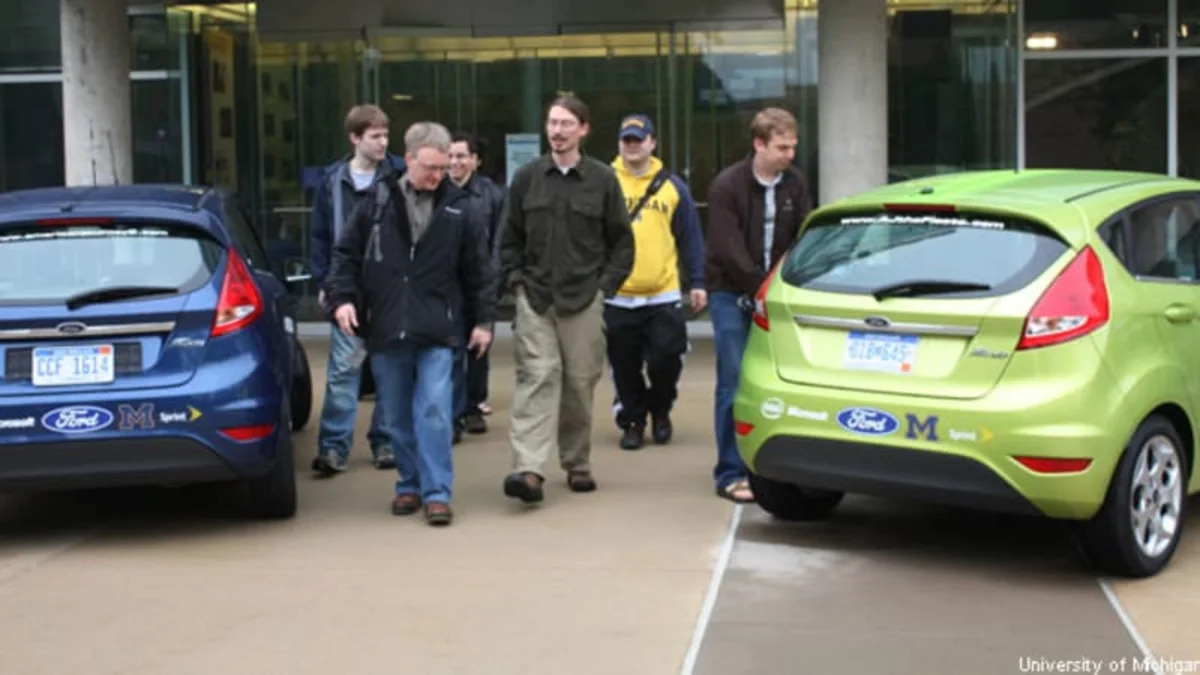
Taking a road trip without a smartphone these days is like driving naked. While old school road trippers used CB's, weatherband radios and maps, these have been obsoleted by smartphones like the iPhone, Android and Blackberry, which can do those tasks and more. But smartphones are only scratching the surface of their potential to entertain and inform motorists, say Dr. Brian Noble and Dr. Jason Flinn, professors at the University of Michigan. To prove this, they teamed up with co-teachers T.J. Giuli and Venkatesh Prasad, both Ford engineers, plus David Graff from Microsoft, to create a class called "Cloud Computing in the Commute."
The course challenged students to design smartphone applications to work with Ford's Sync system, which provides hards-free voice control while linking the phones with the car's own data network. Six teams of four students each set to work developing applications that would bring the benefits of social media into the vehicle. The student teams focused on finding the most fuel efficient route to a destination, pairing riders by Facebook profiles, and keeping track of fellow motorists on a map display.
The goal of the project was to deliver "relevant and personalized content tailored for an individual driver's unique in-car experience," says Flinn.
The video meant to be presented here is no longer available. Sorry for the inconvenience.
The winning team created an app called "Caravan Track," which keeps a group of cars on a road trip in touch using data from the car's GPS system, the powertrain computer, and a web connection to display the whereabouts of each car on a real-time map. Fellow travellers can monitor fuel levels, speed, and where they stop for food and fuel. The four winning students shared a cross-country drive in a European 1.4-liter Fiesta equipped with broadband connections to a Maker Faire event in Silicon Valley's San Mateo County, California.
Another of the apps, dubbed "The Greenride Challenge," is a virtual hitchhiking service that takes requests for rides from hitchhikers and sends them to drivers heading out on spontaneous errands or cross-country road trips. Rider suitability is determined by matching social profiles.
The "Nostramap" app measures notifications of accidents, road construction or police speed traps to verify where a traffic snag may be occurring. Students say the information gathered by motorists using the application could be provided to road-maintenance crews, too.
A "Fuel Tracker" app keeps track of the fuel mileage users get driving on certain commutes, and suggests alternate routes that are more efficient, such as those with fewer stops, traffic or hills. "Once multiple people use a route, you can use it as a comparison and see what path offers the most fuel efficiency," says team spokesman Paul Coldren.
An application called "Listen. Speak. Rate. Share." studies preferences in leisure activities, and blends in recommended hot spots from social networks like Facebook, Twitter and LinkedIn and suggests where to eat, dance, party, or whatever else the driver's heart desired. A similar "Points of Interest" application takes the driver's profiles from the social networks, combines them with previous locations visited, and predicts future businesses and recreational spots for the driver to visit.
Ford predicts that by providing access for application developers to create new abilities for smart phones during road trips, the developer community will follow the successful model of Apple's iPhone, which has turned into a $4 billion a year business in the U.S. Using Ford's Sync platform, developed with Microsoft as well as with university students, means the applications will be just as easy to use in a car as in a coffee shop.


Sign in to post
Please sign in to leave a comment.
Continue